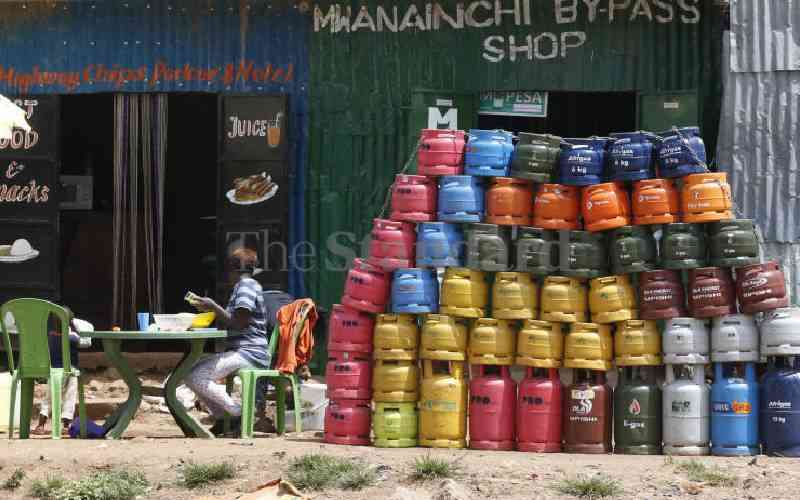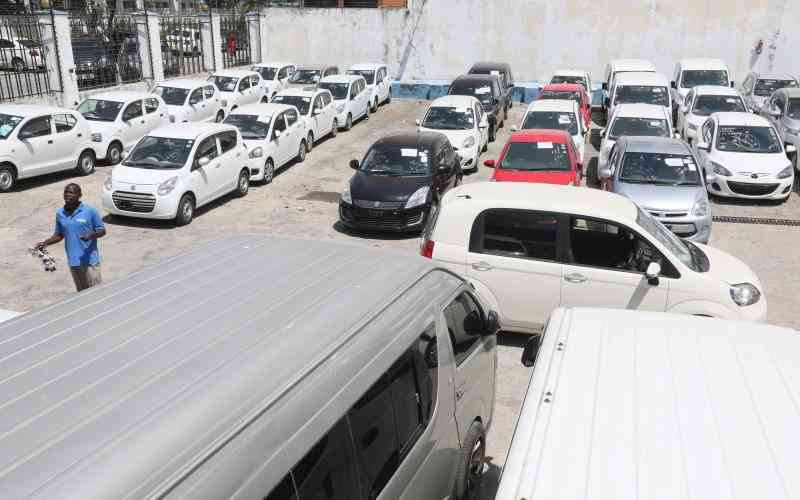The lack of adequate vehicle registration number plates has been a perennial problem in the country, culminating in the delayed release of imported cars from the Port of Mombasa.
By law, imported second-hand vehicles cannot be cleared without being allocated a registration number. This often leads to the stockpiling of thousands of vehicles in Container Freight Stations (CFSs).
Storage charges
Number plates are manufactured by the prisons department, with Kamiti Maximum Prison producing about 1,000 pieces a day.
But according to Car Importers Association of Kenya (CIAK) Chairman Peter Otieno, this is not enough for the small cars, motorbikes, tuk tuks, heavy vehicles, tractors and specialised vehicles that come into the country daily.
“[For cars alone], we need to have a minimum of about 1,500 number plates a day. In fact, if they can produce about 2,000 a day, then nobody would need to wait for cars from CFSs,” he said.
With the motor vehicle market usually peaking towards the end of the year, imports of small cars have increased to about 15,000 units per month since October, against a usual average of 12,000.
“If you are lucky, it takes about three days to get a number plate, but on average, it takes a week or two,” said Mr Otieno.
He added that as a result of a number plates shortage in the last three months, CFS storage costs per vehicle have increased from a low of Sh19,600 to Sh39,200.
This is in addition to importers getting saddled with extra warehousing charges imposed by the customs authority after their vehicles stay at the port for longer than 21 days after landing.
The situation is also worsening congestion at the port, with CFSs struggling to find space to accommodate incoming cargo.
Last week’s decision by the Customs Department to have car dealers submit request letters to clear their vehicles and bypass the delays occasioned by an inadequate supply of number plates is brewing controversy rather than relief in the industry.
Blanket release
Some car importers have protested against the idea, which was communicated to the Kenya Ports Authority by Commissioner of Customs Beatrice Memo.
The vehicle dealers argue that while it is a move in the right direction, it is inconvenient, particularly as there are importers who bring in hundreds of vehicles a month.
Stay informed. Subscribe to our newsletter
“How many letters are we going to write? And if each and every person applies for exemption, how many letters will they deal with? If they agree to release the vehicles, let it be a blanket release,” said Otieno.
According to CIAK, each CFS gets 100 to 200 number plate applications a day.
“I believe the decision was made by the [customs] commissioner in consultation with the National Transport and Safety Authority [NTSA],” said Otieno.
NTSA oversees the issuance of vehicle registration numbers, while the customs department collect taxes and duties on imports and exports.
But Association of Importers of Kenya (AIK) Chairman Peter Mambembe welcomed Ms Memo’s communication, saying players had been lobbying for a policy that would address delays and lower storage costs.
“I think it’s fine because even if we’ll write a thousand letters, it’s better than paying Sh30,000, for instance. And what logic is there in leaving a car at the port for one or two extra weeks? This move will save investors a lot of money,” he said.
Otieno added that though some importers may begin submitting request letters for the release of their vehicles to beat the eight-year age limit deadline that expires on December 31, they would only be doing so out of desperation.
“But you know, this should not be seen as a favour because we are paying duties and for registration,” he said.
[email protected]
 The Standard Group Plc is a
multi-media organization with investments in media platforms spanning newspaper
print operations, television, radio broadcasting, digital and online services. The
Standard Group is recognized as a leading multi-media house in Kenya with a key
influence in matters of national and international interest.
The Standard Group Plc is a
multi-media organization with investments in media platforms spanning newspaper
print operations, television, radio broadcasting, digital and online services. The
Standard Group is recognized as a leading multi-media house in Kenya with a key
influence in matters of national and international interest.
 The Standard Group Plc is a
multi-media organization with investments in media platforms spanning newspaper
print operations, television, radio broadcasting, digital and online services. The
Standard Group is recognized as a leading multi-media house in Kenya with a key
influence in matters of national and international interest.
The Standard Group Plc is a
multi-media organization with investments in media platforms spanning newspaper
print operations, television, radio broadcasting, digital and online services. The
Standard Group is recognized as a leading multi-media house in Kenya with a key
influence in matters of national and international interest.









